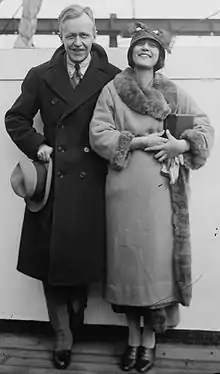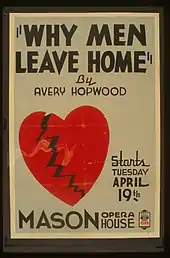Avery Hopwood
James Avery Hopwood (May 28, 1882 – July 1, 1928) was an American playwright of the Jazz Age. He had four plays running simultaneously on Broadway in 1920.
Avery Hopwood | |
|---|---|
 Hopwood in 1922 | |
| Born | May 28, 1882 Cleveland, Ohio, United States |
| Died | July 1, 1928 (aged 46) Juan-les-Pins, Antibes, France |
| Occupation | Playwright |
| Nationality | American |
| Genre | Theatre |
Early life
Hopwood was born to James and Jule Hopwood on May 28, 1882, in Cleveland, Ohio.[1] He graduated from Cleveland's West High School in 1900.[2] In 1901, he began attending the University of Michigan in Ann Arbor. However, his family experienced financial difficulties, so for his second year he transferred to Adelbert College. He returned to the University of Michigan in the fall of 1903, and graduated Phi Beta Kappa in 1905.[3]
Career
Hopwood started out as a journalist for a Cleveland newspaper as its New York correspondent, but within a year had a play, Clothes (1906), produced on Broadway. He became known as "The Playboy Playwright"[4] and specialized in comedies and farces, some of them with material considered risqué at the time. One play, The Demi-Virgin in 1921, prompted a court case because of its suggestive subject matter, including a risque game of cards, "Stripping Cupid", where a bevy of showgirls teased the audience in their lingerie. The case was dismissed.
His many plays included Nobody's Widow (1910), starring Blanche Bates; Fair and Warmer (1915), starring Madge Kennedy (filmed in 1919); The Gold Diggers (1919), starring Ina Claire (filmed in 1923 as The Gold Diggers, in 1928 as Gold Diggers of Broadway and also as Gold Diggers of 1933); Ladies' Night, 1920, starring Charlie Ruggles (filmed in 1928); the famous mystery play The Bat (with Mary Roberts Rinehart), 1920 (filmed in 1926 as The Bat, in 1930 as The Bat Whispers, and in 1959 as The Bat); Getting Gertie's Garter (with Wilson Collison), 1921, starring Hazel Dawn (filmed in 1927 and 1945); The Demi-Virgin, 1921, also starring Dawn; The Alarm Clock, 1923; The Best People (with David Gray), 1924 (filmed in 1925 and as Fast and Loose in 1930), the song-farce Naughty Cinderella, 1925, starring Irene Bordoni and The Garden of Eden in 1927 (filmed in 1928 as The Garden of Eden).
Hopwood was asked to write the third act of Mary Roberts Rinehart's play The Bat.[5] Hopwood collaborated with Rinehart to then work on the last act of the play in Sewickley and sometimes in New York.[5]
The early sound film The Bat Whispers played an influence on Bob Kane's Batman because the inspiration for Batman's costume came from the "mysterious Bat" character portrayed in the movie from 1930.[6]
Personal life

In 1906, Hopwood was introduced to writer and photographer Carl Van Vechten. The two became close friends and were sometimes sexual partners.[7] In the 1920s Hopwood had a tumultuous and abusive romantic relationship with fellow Cleveland-born playwright John Floyd.[8] Although Hopwood announced to the press in 1924 that he was engaged to vaudeville dancer and choreographer Rosa Rolanda, Van Vechten confirmed in later years that it was a publicity stunt. Rolanda would later marry caricaturist Miguel Covarrubias.
On July 1, 1928, at Juan-les-Pins on the French Riviera, Hopwood was accidentally drowned.[9] He was buried in Riverside Cemetery, Cleveland.[10] His mother, Jule Hopwood, inherited a large trust from him, but he had not made arrangements for the disposition of other items, including literary rights. While she was working through the legal issues with his estate, Jule Hopwood fell ill and died on March 1, 1929. She was buried next to her son.[11]
Legacy
Hopwood's plays were very successful commercially, but did not have the lasting literary significance he hoped to achieve.[12]
Hopwood Award
The terms of Hopwood's will left a substantial portion of his estate to his alma mater, the University of Michigan for the establishment of the Avery Hopwood and Jule Hopwood Creative Writing Awards. The bequest stipulated: "It is especially desired that students competing for prizes shall be allowed the widest possible latitude, and that the new, the unusual, and the radical shall be especially encouraged." Famous Hopwood award winners include Robert Hayden, Marge Piercy, Arthur Miller, Betty Smith, Lawrence Kasdan, John Ciardi, Mary Gaitskill, Edmund White, Nancy Willard, Frank O'Hara, and Steve Hamilton.
The Great Bordello
Throughout his life, Hopwood worked on a novel that he hoped would "expose" the strictures the commercial theater machine imposed on playwrights, but the manuscript was never published. Jack Sharrar recovered the manuscript for this novel in 1982 during his research for Avery Hopwood, His Life and Plays. The novel was published in July 2011 by Mondial Books (New York) as The Great Bordello.
Works


- Clothes (1906) with Channing Pollock
- This Woman and This Man (1909)
- Seven Days (1909) with Mary Roberts Rinehart
- Judy Forgot (1910)
- Nobody's Widow (1910)
- Somewhere Else (1913)
- Fair and Warmer (1915)
- Sadie Love (1915)
- Our Little Wife (1916)
- Double Exposure (1918)
- Tumble In (1919, musical version of Seven Days)
- The Gold Diggers (1919)
- The Girl in the Limousine (1919) with Wilson Collison
- Ladies' Night (1920) with Charlton Andrews
- Spanish Love (1920, Adaptation of María del Carmen by Josep Feliu i Codina) with Mary Roberts Rinehart
- The Bat (1920) with Mary Roberts Rinehart
- Getting Gertie's Garter (1921) with Wilson Collison
- The Demi-Virgin (1921)
- Why Men Leave Home (1922)
- Little Miss Bluebeard (1923, Adaptation of Kisasszony férje by Gábor Drégely)
- The Alarm Clock (1923, Adaptation of La Sonnette d'alarme by Maurice Hennequin and Romain Coolus)
- The Best People (1924) with David Gray
- The Harem (1924) with Ernest Vajda
- Naughty Cinderella (1925, Adaptation of Pouche by René Peter and Henri Falk)
- The Garden of Eden (1927, Adaptation of Der Garten Eden by Rudolf Bernauer and Rudolf Österreicher)
Filmography
- Clothes (1914, based on Clothes)
- Judy Forgot (1915, based on Judy Forgot)
- Our Little Wife (1918, based on Our Little Wife)
- Sadie Love (1919, based on Sadie Love)
- Fair and Warmer (1919, based on Fair and Warmer)
- Guilty of Love (1920, based on This Woman and This Man)
- Clothes (1920, based on Clothes)
- The Little Clown (1921, based on The Little Clown)
- The Gold Diggers (1923, based on The Gold Diggers)
- Why Men Leave Home (1924, based on Why Men Leave Home)
- The Girl in the Limousine (1924, based on The Girl in the Limousine)
- Miss Bluebeard (1925, based on Little Miss Bluebeard)
- The Best People (1925, based on The Best People)
- The Bat (1926, based on The Bat)
- Good and Naughty (1926, based on Naughty Cinderella)
- Nobody's Widow (1927, based on Nobody's Widow)
- Getting Gertie's Garter (1927, based on Getting Gertie's Garter)
- The Garden of Eden (1928, based on The Garden of Eden)
- Ladies' Night in a Turkish Bath (1928, based on Ladies' Night)
- Gold Diggers of Broadway (1929, based on The Gold Diggers)
- Her Wedding Night (1930, based on Little Miss Bluebeard)
- Marions-nous (France, 1931, based on Little Miss Bluebeard)
- Su noche de bodas (Spain, 1931, based on Little Miss Bluebeard)
- Ich heirate meinen Mann (Germany, 1931, based on Little Miss Bluebeard)
- A Minha Noite de Núpcias (Portugal, 1931, based on Little Miss Bluebeard)
- Fast and Loose (1930, based on The Best People)
- The Bat Whispers (1930, based on The Bat)
- This Is the Night (1932, based on Naughty Cinderella)
- Gold Diggers of 1933 (1933, based on The Gold Diggers)
- Night of the Garter (UK, 1933, based on Getting Gertie's Garter)
- The Model Husband (Germany, 1937, based on Fair and Warmer)
- Unsere kleine Frau (Germany, 1938, based on Our Little Wife)
- Mia moglie si diverte (Italy, 1938, based on Our Little Wife)
- Gröna hissen (Sweden, 1944, based on Fair and Warmer)
- Getting Gertie's Garter (1945, based on Getting Gertie's Garter)
- Painting the Clouds with Sunshine (1951, based on The Gold Diggers)
- Oppåt med Gröna Hissen (Sweden, 1952, based on Fair and Warmer)
- The Model Husband (West Germany, 1956, based on Fair and Warmer)
- The Bat (1959, based on The Bat)
- The Model Husband (Switzerland, 1959, based on Fair and Warmer)
- Den grønne elevator (Denmark, 1961, based on Fair and Warmer)
- Den grønne heisen (Norway, 1981, based on Fair and Warmer)
References
- Sharrar 1998, pp. 8–9
- Sharrar 1998, p. 1
- Sharrar 1998, pp. 12–17
- Jim Beaver Biography for Avery Hopwood at Internet Movie Database
- Cohn, Jan (1980). Improbable Fiction: The Life of Mary Roberts Rinehart. University of Pittsburgh press. p. 138.
- Kane, Bob. Batman and Me. Forestville, CA: Eclipse Books. p. 38.
- White 2014, pp. 71–73
- Sharrar 2005, p. 201
- https://case.edu/ech/articles/h/hopwood-avery
- Wilson, Scott. Resting Places: The Burial Sites of More Than 14,000 Famous Persons, 3d ed.: 2 (Kindle Location 22102). McFarland & Company, Inc., Publishers. Kindle Edition
- Vigil, Vicki Blum (2007). Cemeteries of Northeast Ohio: Stones, Symbols & Stories. Cleveland, OH: Gray & Company. ISBN 978-1-59851-025-6
- Bader 1959, p. 68
Works cited
- Bader, Arno L. (December 5, 1959). "Avery Hopwood, dramatist". Quarterly Review: A Journal of University Perspectives. 66 (10): 60–68.
- Sharrar, Jack F. (1998) [1989]. Avery Hopwood: His Life and Plays. Ann Arbor, Michigan: University of Michigan Press. ISBN 0-472-10963-4. OCLC 924828273.
- Sharrar, Jack F. (2005). "Hopwood, Avery". In Harbin, Billy J.; Marra, Kim & Schanke, Robert A. (eds.). The Gay & Lesbian Theatrical Legacy: A Biographical Dictionary of Major Figures in American Stage History in the Pre-Stonewall Era. Ann Arbor, Michigan: University of Michigan Press. pp. 199–203. ISBN 0-472-09858-6. OCLC 56481825.
- White, Edward (2014). The Tastemaker: Carl Van Vechten and the Birth of Modern America. New York: Farrar, Straus and Giroux. ISBN 978-0-374-70881-8. OCLC 846545238.
Further reading
- Broadway, by Brooks Atkinson. NY: Macmillan Publishing Co., 1974.
- Matinee Tomorrow, by Ward Morehouse. NY: McGraw-Hill Book Company, 1948.
- Posing a Threat: Flappers, Chorus Girls, and Other Brazen Performers of the American 1920s, by Angela Latham. Hanover and London: Wesleyan University Press, 2000.
- The Splendid Drunken Twenties: Carl Van Vechten Selections from the Daybooks, 1922–1930. Edited by Bruce Kellner. Urbana and Chicago: University of Illinois Press, 2003.
External links
| Wikimedia Commons has media related to Avery Hopwood. |
- Works by Avery Hopwood at Project Gutenberg
- Works by or about Avery Hopwood at Internet Archive
- Avery Hopwood at the Internet Broadway Database
- Avery Hopwood at IMDb
- Mary Roberts Rinehart at University of Pittsburgh digital library – includes material on her collaboration with Hopwood